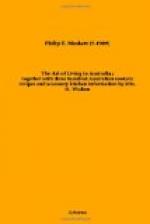In the early part of the present century another reformer, Friedrich Wilhelm August Froebel, arose to influence all future educational methods. As with Rousseau, Froebel held that each age belonged to itself, and that the perfection of the later stage could only be attained through perfection of the earlier. So, too, while Pestalozzi upheld that the faculties were developed by exercise, Froebel went farther, and added that the function of education was to develop the faculties by arousing voluntary activity, in this way becoming, according to Michelet, the greatest of educational reformers. Froebel was convinced that man was primarily a doer, indeed, even a creator, and that he learnt only through “self-activity.” In action, moreover, there was not alone the mere physical exercise, but also the actual unfolding and strengthening of the mental powers. To Froebel, indeed, belongs the honour of originating the kindergarten system, which is making such progress at the present time; and more than this, it may be said that while it is employed only in the earlier stages of education, yet his principles are beginning to make themselves felt throughout the entire system of education.
As a matter of fact, what is known in Sweden and in Finland as sloyd, or manual instruction, may be regarded as a continuation of the Kindergarten system. Through the exertions of Uno Cygnaeus the whole of the national system of education in Finland was reorganized, and manual work was first made a part of the regular instruction in the common schools. In Sweden, likewise, the same principles have been introduced chiefly by Herr Otto Salomon, the director of the great sloyd seminarum at Naas. Sloyd work is used in the schools in a disciplinary way as an integral part of general education; the children, generally boys, are employed for a certain number of hours a week in making articles of common household use. It is maintained that work of this kind is specially invaluable in supplementing the ordinary school education of the three R’s. It fulfils the injunction “to put the whole boy to school;” it develops faculties which would otherwise lie dormant, while at the same time it trains the eye and does away with clumsy fingers.
THE PURPOSE OF EDUCATION.
From the foregoing it will be seen that within the last 130 years a striking change has come over the view held respecting education. Prior to that time an artificial and pedantic method prevailed, which received its first check from the pen of Rousseau. The system which he attacked, however, built up as it was upon centuries of mediaeval learning, was not to be disposed of by this one encounter. Such a result was not to be expected in the natural order of things; but as the ideas of Rousseau contained the living truth, they were bound to find advocacy in due course, and though the seed might lie quiescent for a time, yet it was sure to germinate sooner or later. After him the path of educational reform was illumined by the genius of Pestalozzi, and a few years later Froebel appeared to influence for ever the methods of education. Indeed, it was the latter who by his kindergarten system has founded the practical education of our own day.




